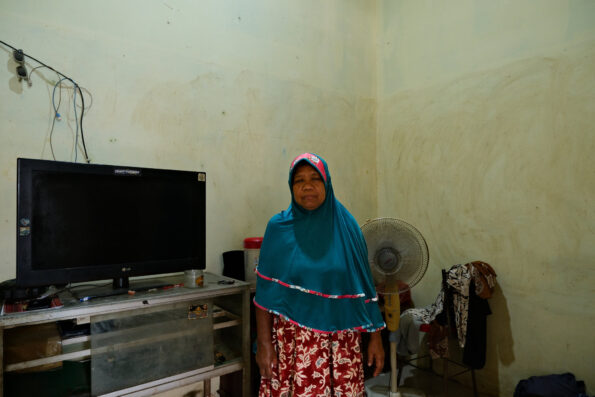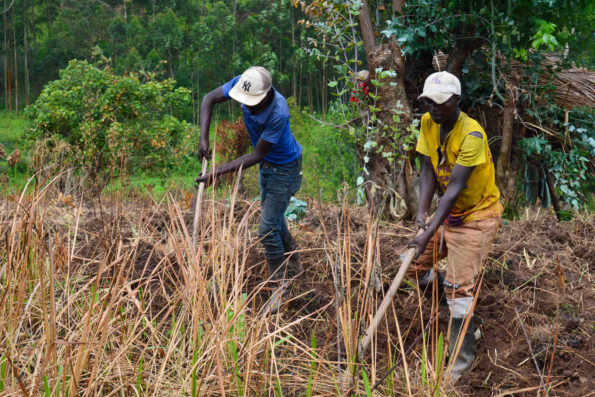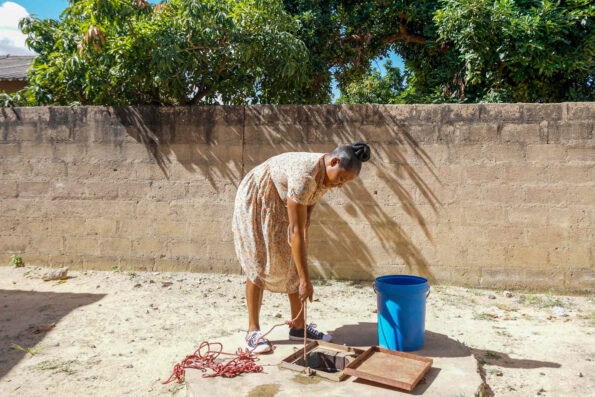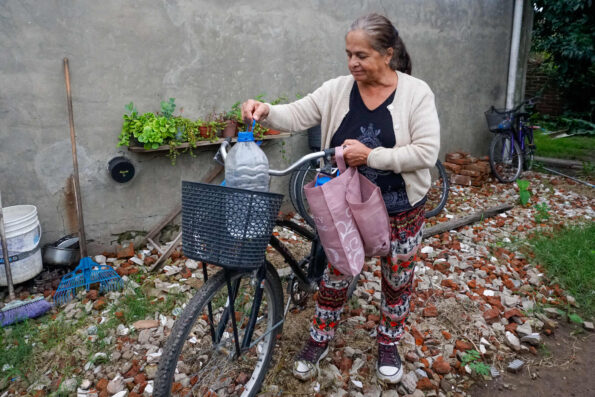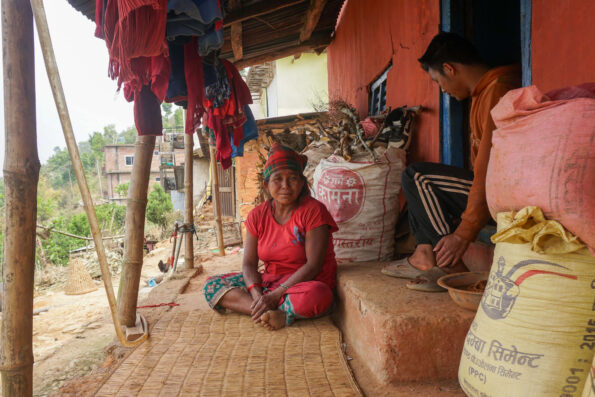
Ishbel Cora Rodríguez, GPJ Puerto Rico
Cristina González inspects seedlings at Neo Jibairo Farm in Río Grande, Puerto Rico.
RÍO GRANDE, PUERTO RICO — Francisco Castro walks among the passion fruit, papayas, tomatoes and beans on his ecological farm – a tribute to Puerto Rico’s perfect blend of soil and climate.
“Puerto Rico is blessed,” he says.
Puerto Rico depends on food imported from the contiguous United States, leaving it vulnerable to delivery delays during hurricanes, natural disasters, or global pandemics like the new coronavirus. Castro is one of dozens of farmers and urban dwellers attempting to change this by promoting small-scale ecological agriculture, despite a government plan to boost industrial farming.
A rustic wooden sign greets visitors at the entrance to Neo Jibairo Farm, where Castro, 30, has worked for the last four years. Short banana trees divide crops from a long grassy path and a large greenhouse. The farm is situated in Río Grande, a town on the east coast of Puerto Rico. Castro helps harvest the goods, then packs and distributes them to six organic supermarkets as well as restaurants and hotels in metropolitan areas.
This model encourages people to consume from Puerto Rico’s farms, Castro says, rather than from supermarkets, which tend to stock imported goods. Despite Puerto Rico’s ideal climate, 89% of food in Puerto Rico was imported in 2017, according to the Puerto Rican Department of Agriculture.
That makes Puerto Rico susceptible to a food shortage as the coronavirus spreads, says Nelson Alvarez Febles, an author and expert in ecological agriculture and sustainable public policy. Disruptions in transportation and potential impacts on food production from California to Texas could have a direct impact on Puerto Rico, he says, in even a few weeks.
“Given this situation, it is very important that quick and efficient measures are taken to increase food production in Puerto Rico.”



But farmers trying to make that shift face numerous obstacles. Past policies and a history of tepid government support for agriculture hold small farmers back, says Alvarez Febles.
Before the 1940s, Puerto Rico produced two-thirds of its food. That changed when the government implemented Operation Bootstrap, an industrialization policy that encouraged farmers to relocate to cities and work in factories, Alvarez Febles says. Puerto Rico then started to import more food.
A United States law known as the Jones Act further complicates the situation. The law requires U.S. ships to transport all merchandise to Puerto Rico, which increases the price of goods for Puerto Ricans. It costs an average of $3,027 to ship container goods to Puerto Rico on a U.S. ship, while it would cost $1,206 on similar-sized international shipments, according to a 2019 report by Advantage Business Consulting, an economic consulting firm in Puerto Rico.
The Jones Act also means that when hurricanes hit the Caribbean and officials close ports, food imports are delayed. This happened with Hurricane Maria in 2017, one of the region’s worst natural disasters.
“After Hurricane Maria, we went into a major food crisis – there wasn’t any food,” Castro, the farmer, says. Ports were closed just before the hurricane hit, then for days after. Combined with a lack of refrigeration due to a destroyed electrical grid and blocked roads, Puerto Ricans faced a food shortage.
The Puerto Rican government argues that small ecological farms wouldn’t solve this problem. Instead, the government plans to double agricultural production, based on a model Secretary of Agriculture Carlos Flores Ortega calls “corporate agriculture.”
Families don’t have time to cook, he says, so the government supports the production and distribution of convenient, pre-chopped and packaged fruit and vegetables. It also wants to use new technology and techniques, such as controlled environments and hydroponics.
“We have to process a lot of our goods, so that families can buy them and use them,” he says. “If we don’t do that, they end up using processed goods that weren’t produced here.”



Small farmers can’t meet all of Puerto Rico’s food needs, he says, because Puerto Ricans prefer a meat-heavy diet, and Puerto Rico doesn’t have enough land. Meat farming requires much more land than vegetables, he says, arguing that Puerto Rico’s population is too high for the amount of meat it can produce. Beef production uses six times more land than peas, for example, according to research published in 2018 in the academic journal Science.
Alvarez Febles, the author, doesn’t buy the argument. The government isn’t promoting agro-industry for the sake of citizens’ food security, he says, but instead for the interests of big businesses.
A growing number of farmers and young people are fighting the government’s plan by promoting local harvests and distributing the food in urban areas.
Yamaira Hickey Morales, 24, and Miguel García González, 27, spend weekends on their family farms in Florida, in north-central Puerto Rico, or Morovis, a town nearby. They clear the soil, clean, pull weeds, harvest crops and plant seeds, Hickey Morales says.
They transport the harvest to the capital, San Juan, where they sell their products from the back of their truck at prices cheaper than at grocery stores. They call the project a mobile harvest.
So far, they have grown avocados, bananas, papayas, pumpkins, oranges, grapefruit, guava and mandarins. They’re now growing their first batches of yucca, bread fruit and pigeon peas.
Locals come out of their homes in Avenida Universidad de Río Piedras, a neighborhood in San Juan, to buy avocados from García González. As he weighs them, he describes how more people are buying such products because they are healthier, don’t use pesticides and cost less than at supermarkets.
A single supermarket avocado costs $3, while local farmers like Hickey Morales and García González sell them for $1 or $2. A bunch of fragrant cilantro typically costs $1 at the farmers’ market but $1.89 at the supermarket.
Cristina González works with Castro at Neo Jibairo Farm. Her large straw hat protects her from the blazing sun. They see farms like these as the future and are developing a tourism project to incentivize agricultural education.
The project, aimed at both international and local tourists, will involve a tour of the farm, including the nursery, hydroponics, tobacco fields, composter and butterfly sanctuary. It will teach people about agro-ecology – the United Nations Food and Agriculture Organization’s name for sustainable development that supports social, environmental and economic needs.
Cristina González wants Puerto Ricans to learn how farmers work, determine soil health and manage natural resources.
“People want to learn,” she says, “and they are willing to pay.”
Hickey Morales and García González began their food distribution project two weeks after Hurricane Maria paralyzed the area. García González says he hopes it will take root.
Rishi Khalsa, GPJ, translated this story from Spanish.


